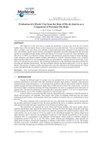从废弃的泡沫聚苯乙烯中合成活性炭并有效去除水溶液中的镍(II)
IF 1.2
4区 材料科学
Q4 MATERIALS SCIENCE, MULTIDISCIPLINARY
引用次数: 0
摘要
由于城市化的快速发展和人口的快速增长,对固体废物的处理提出了巨大的本质要求。以KOH为试剂,在300 ~ 675℃的温度范围内,以75℃的间隔进行泡沫乙烯的炭化。对氢离子功率、灰分、水分、固定碳、挥发分、碘吸附值、甲基蓝值等进行了表征。结果表明,在525℃的温度下得到的活性炭具有良好的碳特性。通过pH值、接触时间、碳投加量、搅拌速度、镍(II)效价等因素的批量实验,确定了镍(II)的吸附效果。本分析处理固定床柱从溶液中去除镍(II)。结果表明,吸附-二级动力学模型最符合数据,并对Adams-Bhorat、Thomas和Yoon Nelson等模型进行了评价。在所有3种模型中,增加床层高度可以更好地去除镍(II)。因此,利用泡沫乙烯衍生的活性炭作为介质,从水溶液中持续吸附镍(II)。本文章由计算机程序翻译,如有差异,请以英文原文为准。
Synthesized activated carbon derived from discarded styrofoam and effectively removal of nickel (II) from aqueous solutions
Due to the rapid urbanisation and rapid population explosion, there is a vast essential requirement in the dispose of solid waste. Carbonization of Styrofoam is carried out at varying temperature ranges of 300°C to 675°C at an interval of 75°C using KOH as reagent. The Characterisation of power of hydrogen ion, ash and moisture content, fixed carbon, Volatile matter, iodine adsorption value, methyl blue value was conducted. It was found that the activate carbon obtain from the temperature of 525°C has a good carbon characteristic. The batch experiment such has pH, contact time, carbon dosage, agitation speed, potency of Nickel (II) was conducted with the purpose of ascertaining the efficiency of Nickel (II) adsorption. This analysis deals with fixed bed column to remove Nickel (II) from a solution. The results indicated that the sorption-second order kinetic model was the most appropriate fit for the data, and alternative models such as Adams-Bhorat, Thomas, and Yoon Nelson’s were also evaluated. Increasing a bed height resulted in better removal of Nickel (II) in all 3 models. Therefore, The utilization of Styrofoam-derived activated carbon as a medium for ongoing Nickel (II) adsorption from an aqueous solution.
求助全文
通过发布文献求助,成功后即可免费获取论文全文。
去求助
来源期刊

Materia-rio De Janeiro
MATERIALS SCIENCE, MULTIDISCIPLINARY-
CiteScore
1.00
自引率
25.00%
发文量
51
审稿时长
6 weeks
期刊介绍:
All the articles are submitted to a careful peer-reviewing evaluation process by the journal''s Editorial Board. The Editorial Board, reviewers and authors make use of a web based proprietary automated tool to deal with the reviewing procedures.the Revista Matéria''s article reviewing restricted access system - SEER. Authors are not informed about the identity of the reviewers.
 求助内容:
求助内容: 应助结果提醒方式:
应助结果提醒方式:


